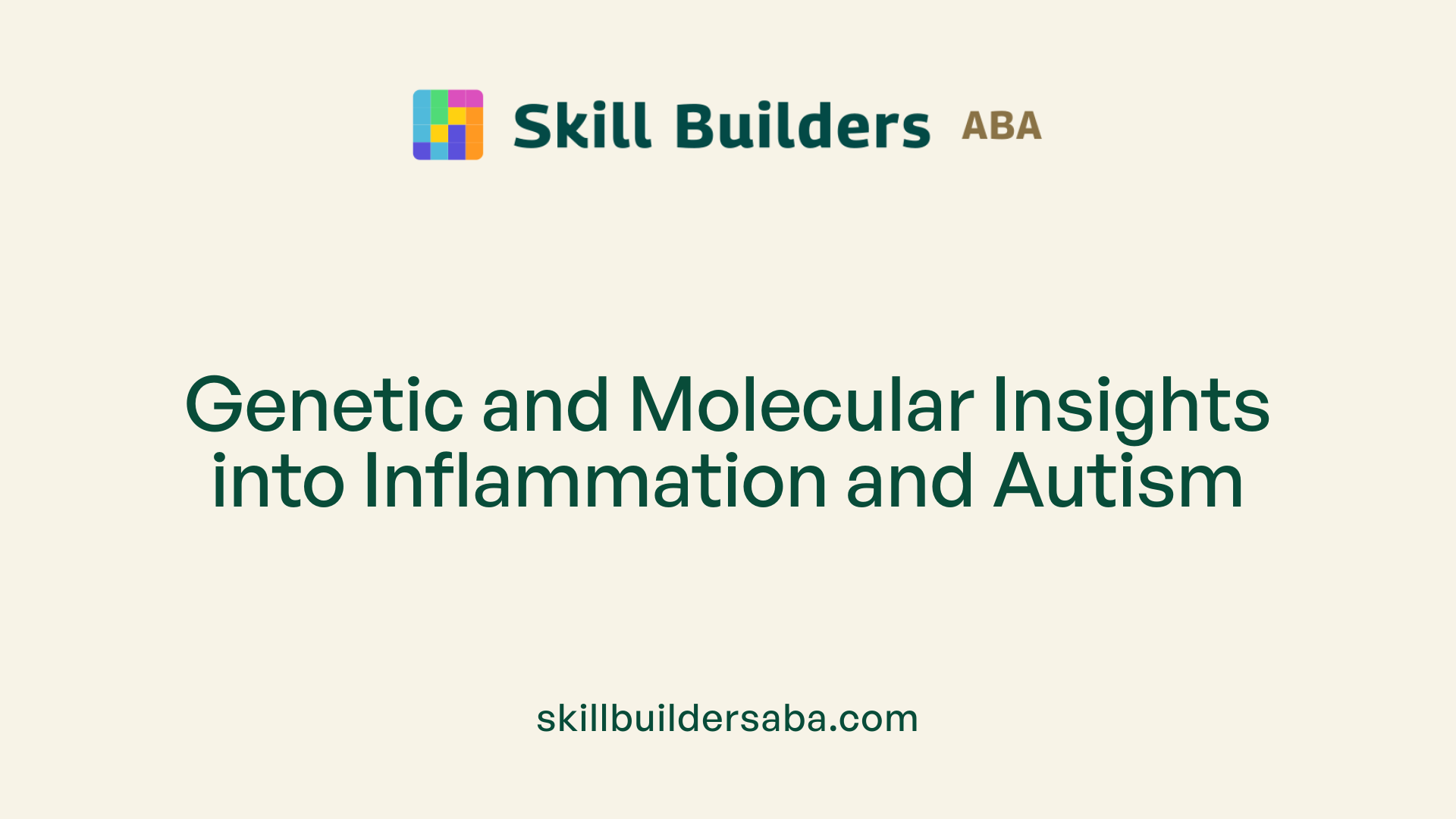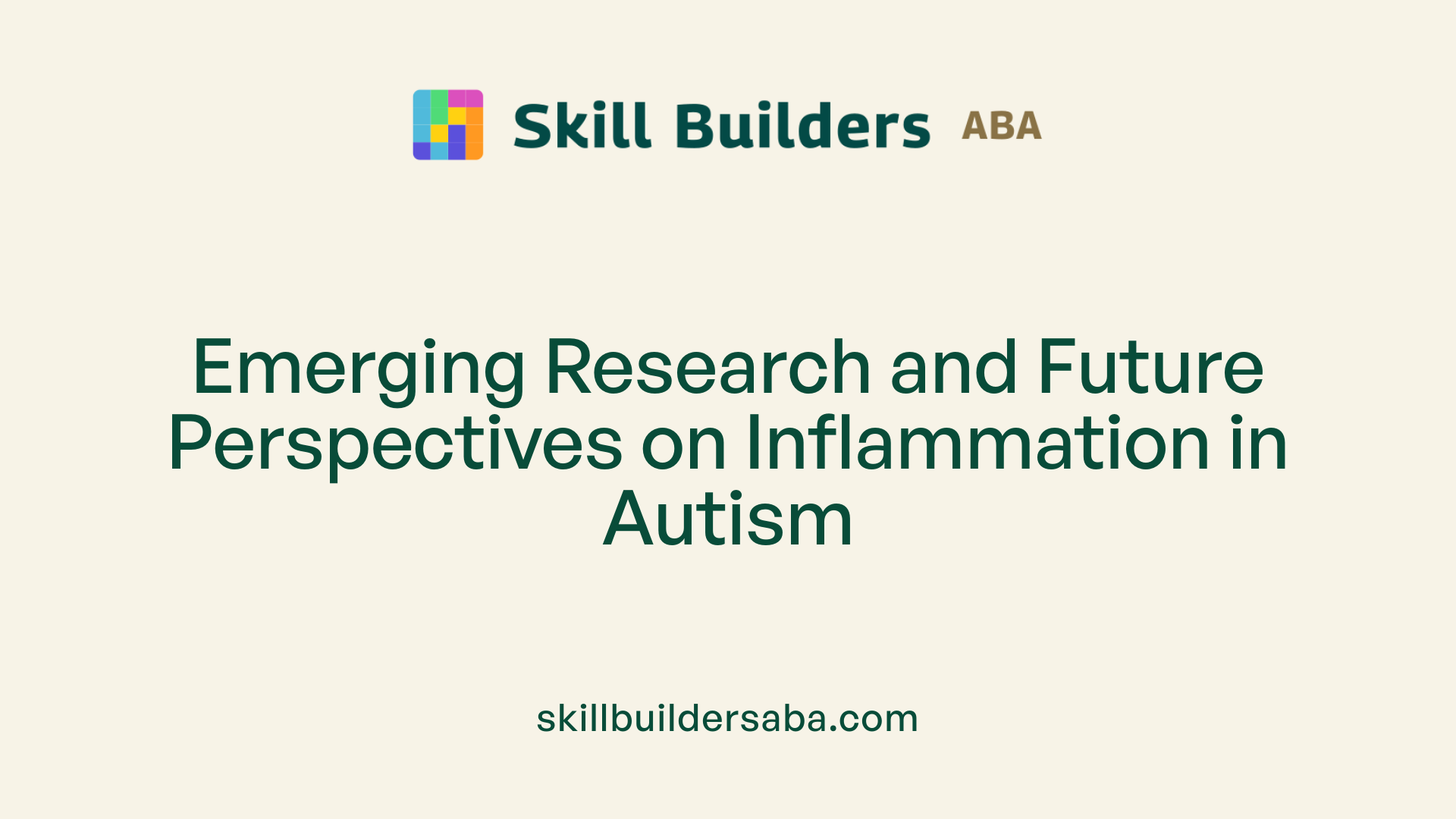Inflammation and Autism
Unraveling the Link Between Inflammation and Autism: Emerging Insights and Therapeutic Perspectives

A Deep Dive into the Biological Interplay of Inflammation and Autism Spectrum Disorder
Recent scientific advances have shed light on the crucial role of inflammation and immune dysregulation in the development and manifestation of Autism Spectrum Disorder (ASD). From neuroinflammatory pathways in the brain to systemic immune anomalies, these findings open new avenues for understanding autism’s complex pathology and exploring targeted therapies. This article synthesizes current research trends, biological mechanisms, useful biomarkers, and potential treatments, providing a comprehensive overview of inflammation's connection to autism.
Biological Foundations of Inflammation in Autism

What is the relationship between inflammation and autism spectrum disorder (ASD)?
Research increasingly highlights that inflammation is a significant factor in the development of ASD, impacting neurodevelopmental processes crucial for typical brain growth and function.
Neuroinflammation is marked by the activation of microglia and astrocytes in the brain. These immune cells, when activated, release inflammatory cytokines such as IL-6, IL-1β, IL-17, and TNF-α. Elevated levels of these cytokines have been documented in the brain tissue, cerebrospinal fluid, and blood of individuals with ASD. This inflammatory environment can hinder the proper maturation of neurons in critical regions, especially the cerebellum.
Specifically, inflammation during early childhood prevents the full development of key neurons like Purkinje and Golgi cells in the cerebellum. These neurons are essential for motor coordination, language, and social-emotional regulation. Disruption in their development is linked to core ASD behaviors.
Alongside neuroinflammation, systemic immune dysregulation plays a role. Elevated cytokines in peripheral blood and increased activation of immune cells like monocytes, T cells, and B cells suggest an ongoing immune response that may affect brain function.
The maternal immune system during pregnancy, particularly the presence of IL-17a, has been associated with increased ASD risk. Maternal infections, autoimmune reactions, or high levels of inflammatory molecules can influence fetal brain development. Evidence from animal models shows that maternal immune activation can lead to autism-like behaviors in offspring and alterations in the gut microbiota, which may contribute to systemic and neural inflammation.
Moreover, gastrointestinal inflammation and gut microbiota imbalance—referred to as dysbiosis—are linked with increased intestinal permeability, allowing pro-inflammatory substances to enter circulation. This gut-brain interaction amplifies neuroinflammation, further impacting neurodevelopment.
In sum, inflammation—both within the brain and systemically—interferes with normal neuronal maturation and connectivity. This cascade of immune responses and cytokine dysregulation underlies many of the behavioral and cognitive features observed in ASD, emphasizing the importance of understanding immune mechanisms for potential therapeutic strategies.
Role of Neuroinflammation in Brain Development and Autism

How does neuroinflammation affect brain development and contribute to autism?
Neuroinflammation plays a crucial role in shaping brain development, especially when it becomes chronic or dysregulated. During early childhood, activation of immune cells in the brain, such as microglia and astrocytes, leads to the release of inflammatory cytokines like IL-6, TNF-α, and IL-1β. While these molecules are essential for normal immune responses, their excess can interfere with developmental processes.
Elevated inflammation markers have been consistently found in the brains and cerebrospinal fluid (CSF) of individuals with autism spectrum disorder (ASD). This persistent immune activation can disrupt how neurons grow, connect, and form proper circuits, which are foundational for typical cognitive, motor, and social functions.
Research shows that neuroinflammation can prevent essential neurons, particularly Purkinje and Golgi cells in the cerebellum, from fully maturing. Since the cerebellum influences motor skills, language, and emotional regulation, its impairment may directly relate to ASD symptoms.
Moreover, neuroinflammation impacts the formation and refinement of neural circuits by altering synaptic connectivity and energy metabolism. The presence of immune molecules and activated microglia suggests that the brain’s immune environment influences neural development, potentially leading to the structural and functional irregularities observed in ASD.
Genetic variants associated with increased levels of inflammatory molecules further demonstrate the link between inflammation and brain changes. For example, IL-6 related gene modifications are connected with alterations in key brain regions involved in language, social interaction, and cognition.
In summary, neuroinflammation not only disrupts critical developmental steps but may also actively cause changes in brain structure and function. This process likely contributes significantly to the onset and severity of autism spectrum disorder, highlighting inflammation as a promising target for early intervention.
Inflammation as a Marker of Autistic Pathophysiology

Are there biomarkers associated with inflammation in autism?
Yes, numerous studies have identified biomarkers linked to inflammation that are associated with autism spectrum disorder (ASD). Researchers have observed altered levels of cytokines in both the peripheral blood and cerebrospinal fluid (CSF) of individuals with ASD.
In the blood, some cytokines such as IL-10 and IL-8 are found at lower levels, indicating immune dysregulation. Interestingly, cytokines commonly associated with inflammation like C-reactive protein (CRP), tumor necrosis factor-alpha (TNF-α), and IL-6 often do not show significant differences, suggesting that specific immune pathways are involved.
Elevated inflammatory cytokines have been consistently detected in the CSF of autistic children, with increased levels of TNF-α, IL-4, IL-21, and B-cell activating factor (BAFF). These markers point towards active neuroinflammation and immune response within the brain.
Furthermore, research indicates that certain cytokines correlate with clinical features, especially behavioral symptoms such as cognitive rigidity and social deficits. This correlation suggests that cytokine levels could serve as biomarkers not only for diagnosis but also for assessing the severity of ASD.
In addition to cytokine levels, other indicators like microglial activation, increased GFAP levels (a marker of gliosis), and activation of inflammatory pathways such as NF-κB are found in the brain tissues of those with ASD, further supporting an inflammatory component.
Overall, the presence of these immune-inflammatory markers, particularly specific cytokines, bolsters the idea that inflammation plays a significant role in the underlying pathology of ASD, and assessing these biomarkers might aid in early diagnosis or targeted intervention.
For more detailed insights, searching terms like "Inflammatory biomarkers in autism diagnosis" can provide additional scientific resources and studies on this topic.
Genetic and Molecular Pathways Linking Inflammation to Autism

What are the biological mechanisms linking inflammation to autism?
The relationship between inflammation and autism spectrum disorder (ASD) involves complex biological processes, primarily centered around neuroinflammation and immune system dysregulation. During prenatal development, maternal immune activation can elevate levels of inflammatory cytokines such as IL-6, IL-17A, IL-1β, and TNF-α. These molecules cross the placenta and can influence fetal brain development, potentially disrupting neuronal proliferation, migration, and synapse formation.
In individuals with ASD, evidence from postmortem brain studies shows persistent activation of microglia and astrocytes—immune cells in the brain—that produce pro-inflammatory cytokines. This ongoing neuroinflammation affects neural connectivity and may contribute to behavioral features of autism.
Furthermore, immune signaling pathways like Toll-Like Receptor (TLR) activation and mitochondrial dysfunction are linked to immune responses triggered by infections or autoimmune processes. These immune responses can lead to gene expression changes related to inflammation, impacting critical processes such as energy metabolism and synaptic integrity.
How do gene expression alterations impact ASD?
Gene expression studies reveal that over 200 genes differ in the brains of autistic individuals compared to controls, many involved in immune responses, synaptic function, and inflammation. Notably, genes regulating microglial activation and inflammatory cytokine production are often upregulated in ASD
Certain genes, like MET, which interacts with inflammatory cytokines such as IL-6, are central to this network. Variants within these genes can influence brain structure and connectivity, often correlating with behavioral symptoms and gastrointestinal issues seen in autism.
What are inflammation-related genetic variants?
Genetic variants that influence inflammatory pathways can elevate the risk or severity of ASD. For example, polymorphisms related to IL-6 and other cytokines modify gene expression levels, affecting brain development.
Research using large genetic cohorts demonstrates that IL-6 related variants are linked with structural changes in key brain areas, including increased volume in the temporal regions and reduced cortical thickness in the frontal cortex. These structural alterations are implicated in ASD.
Signaling pathways like NF-κB
The NF-κB pathway plays a critical role in regulating immune responses and inflammation. Studies show that NF-κB is often aberrantly activated in autistic brains, promoting the chronic production of inflammatory mediators. This sustained activation can lead to neural cell loss and reduced connectivity, contributing to ASD symptoms.
Gene networks involved in immune response
Gene network analyses reveal interconnected pathways involving immune response genes, inflammatory cytokines, and synaptic regulators. These networks highlight how immune dysregulation and persistent inflammation can alter neural circuit development.
Overall, these molecular and genetic pathways underscore the importance of immune processes in ASD, offering potential targets for therapeutic intervention.
Therapeutic Strategies Targeting Inflammation in ASD

What are the potential therapeutic approaches targeting inflammation in ASD?
Given the strong link between inflammation and autism spectrum disorder (ASD), researchers are exploring various treatment avenues that focus on reducing neuroinflammation and modulating immune responses. Among these, anti-inflammatory medications stand out as a promising option. Drugs such as non-steroidal anti-inflammatory drugs (NSAIDs) and cytokine inhibitors aim to diminish chronic brain inflammation, potentially improving behavioral symptoms.
Dietary interventions are also being investigated. Natural anti-inflammatory agents like curcumin, luteolin, quercetin, resveratrol, maternal melatonin, vitamin D, and Coenzyme Q10 have shown preliminary efficacy in modulating immune pathways. These compounds might help reduce cytokine production and oxidative stress, thereby supporting neural health.
Emerging therapies include stem cell treatments, especially mesenchymal stem cells (MSCs), which possess immunosuppressive and tissue-repairing properties. Initial clinical studies suggest that MSC therapy is safe and can have beneficial effects by calming neuroinflammation and promoting neural regeneration.
Additionally, targeted pharmacological approaches aim to block specific inflammatory pathways involved in ASD. For example, agents that inhibit NF-κB, a key regulator of immune responses, or JAK/STAT signaling pathways, could help regulate microglial activation and cytokine secretion.
Some therapies focus on neuroimmune pathways like the histaminergic system. H3 receptor antagonists are being studied for their potential to influence microglia and cytokine production.
Overall, these strategies collectively strive to dampen inflammation in the brain, preserve neural connectivity, and improve behavioral and cognitive symptoms. Combining immunomodulatory approaches with behavioral therapies may provide a comprehensive treatment plan for ASD individuals with prominent neuroinflammatory features.
Research Trends and Future Directions in Inflammation and Autism

Bibliometric analysis
Bibliometric studies have revealed that a significant portion of recent research on autism spectrum disorder (ASD) centers around neuroinflammation, immune responses, cytokine production, oxidative stress, and gut microbiota. These analyses show how the scientific community increasingly recognizes inflammation as a potential contributor to ASD pathology.
Recent trends also emphasize molecular pathways such as NF Kappa B, a key regulator of immune response and inflammation, and the gut-brain axis. This axis involves the bidirectional communication between the gastrointestinal system and the brain, highlighting the role of gut microbiota in neurodevelopmental conditions.
Emerging molecular pathways
Current research focuses on understanding how molecular pathways like NF-κB influence neuroinflammation in ASD. Activation of this pathway can promote chronic inflammation, microglial activation, and cytokine release, affecting neural development.
Another promising area is the gut-brain axis, where alterations in gut microbiota and increased intestinal permeability (leaky gut) may lead to systemic inflammation and impact brain development. These pathways are becoming prime targets for future interventions.
Gut-brain axis and microbiota
Studies have shown that gut microbiota dysbiosis in children with ASD correlates with increased harmful microorganisms and altered metabolite profiles that can influence brain function. The interaction between gut bacteria and immune responses can trigger or exacerbate neuroinflammation.
Research indicates that microbiome alterations may affect early immune programming and neurodevelopmental processes. Modulating gut microbiota through probiotics, diet, or stool transplants shows potential for mitigating inflammation-related ASD symptoms.
Genetic research and biomarker discovery
Genetic studies reveal that over 200 genes are differentially expressed in autistic brains, many involved in immune regulation and inflammation pathways. Variants affecting cytokine levels, such as IL-6, are linked to structural brain changes seen in imaging studies.
Moreover, cytokine profiling in cerebrospinal fluid (CSF) has identified elevated levels of inflammatory markers like IL-1β, IL-6, and TNF-α. These biomarkers highlight inflammation's role and could aid in early diagnosis or monitoring therapeutic response.
Future directions
Looking ahead, research is expected to explore how targeted therapies, including anti-inflammatory agents and microbiota modulation, can improve outcomes in ASD. Advances in genomics and proteomics will further elucidate the complex interactions between immune dysregulation and neurodevelopment.
Overall, a multidisciplinary approach incorporating microbiology, immunology, neuroscience, and genetics is essential to develop effective interventions. Continued exploration of gut-derived inflammatory signals and genetic biomarkers promises to deepen understanding and open new avenues for personalized treatments in ASD.
Towards Precision Medicine in Autism Through Inflammation Management
Understanding the intricate relationship between inflammation and autism opens promising pathways for diagnosis, prognosis, and therapy. As research advances, identifying specific biomarkers and elucidating molecular mechanisms will enable the development of targeted anti-inflammatory treatments. Such personalized approaches could significantly improve the quality of life for individuals with ASD by addressing underlying neuroinflammation, offering hope for more effective interventions and better management of this complex disorder.
References
- Research trends of inflammation in autism spectrum disorders
- New Research Shows How Brain Inflammation in Children May ...
- Inflammation and Neuro-Immune Dysregulations in Autism ...
- Study shows impact of inflammation on the developing brain
- Inflammatory mediators drive neuroinflammation in autism spectrum ...
- Relevance of Neuroinflammation and Encephalitis in Autism - PMC
- Neuroinflammation in autism spectrum disorders - ScienceDirect.com
- Link between inflammation and autism - Harvard Gazette
- Is autism caused by brain inflammation? - Moleculera Labs
.svg)














